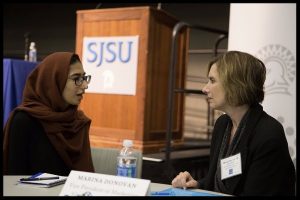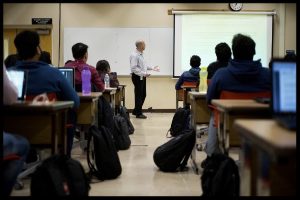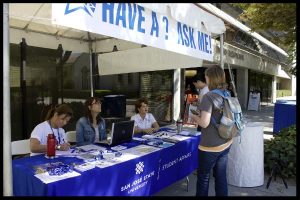
Photo: Moses Kinnah
SJSU Alumna Marina Donovan, ’84 Public Relations, offers career advice to a current student during the Spartan Success Series ‘Major to Career Exploring the Journey’ event in fall 2016.
By Barry Zepel
In the nearly four years since “Spartan Pride” became one of the five core areas of the university’s Vision 2017 Strategic Plan, San Jose State Alumni Association staff members have worked to engage and connect the various sectors that make up the campus community.
Two of the most important elements are students and alumni.
“We recognized what it means to be a Spartan,” said Brian Bates, associate vice president for Alumni Engagement and Annual Giving. “It is the determination, perseverance and grit that each of our students displays towards earning their degree and getting to be an alum, and the extra efforts that our faculty and staff members dedicate to helping the students reach their academic goals.”
Dozens of town hall sessions conducted by the university, in planning for Vision 2017, found that the campus community felt it was important to foster pride for “being a Spartan” in San Jose State University graduates even after they leave campus. Bates said it was important to make the extra effort to invite alumni back to campus and “make them feel welcome.”
“One of the things that emerged the last few years is how much they valued the opportunity to come back to campus and talk to the current students,” he said. “In addition to liking how the campus has changed, alums like how the students engage them and ask questions – many times the kinds of questions they might not ask their professors.”
One of the key initiatives related to the “Spartan Pride” goal has been the creation of a career-oriented program connecting students with alumni established in their fields or industries of interest.
The Spartan Success Series – hosted by the Student Alumni Connection of the Alumni Association – was created in partnership with the university’s Career Center, and held its inaugural events in the spring of 2015. It features career development events providing students and alumni with opportunities to network with industry experts made up of SJSU graduates. Sessions include on-campus and virtual workshops, panels and resume review conferences.
The program has continued to grow in the last few years as more than 400 SJSU alumni have volunteered as career experts, panelists and resume reviewers. That growth was aided by the creation of an online form on which alumni are invited to offer their time and expertise.
“Through providing a combination of both on-campus and virtual workshops, our students have learned to sharpen their skills, build their network, explore career pathways and acquire a competitive edge to carry them into the workforce,” the alumni leader explained.
“It is a win-win-win situation for our students, for our alumni and the university,” added Bates, who also serves as executive director of the SJSU Alumni Association.
Alumna Rene Siegel, ’88 Public Relations, is one of the most dedicated to current San Jose State students.
“I’m passionate about empowering people because I wish I had someone who believed in me when I was a scared and confused college student,” said Siegel, who is founder and president of High Tech Connect, a marketing and communications consulting agency located in Pleasanton. “I want to share my experience to help even more students find their confidence and build a career that reflects their own definition of success.”
Siegel, who earned a bachelor’s in Public Relations, also serves the university as a guest lecturer, was a keynote speaker for the SJSU Student Leadership Conference, and teaches a public relations class during the fall semester. In addition, she and her “team” at High Tech Connect have also provided job-hunting tips and advice for students as well as alumni, including online resume and LinkedIn profile reviews.
Bates noted that credit for the positive results of the Spartan Pride initiative, and specifically the Spartan Success Series, has to be shared by the entire San Jose State community.
“We (alumni association) couldn’t do it all ourselves. It wouldn’t have happened without buy-in from every academic and administrative department of the university, including Spartan Shops and Athletics,” he said. “Of course, having a dedicated force of alumni volunteers and enthusiastic students is key.”



